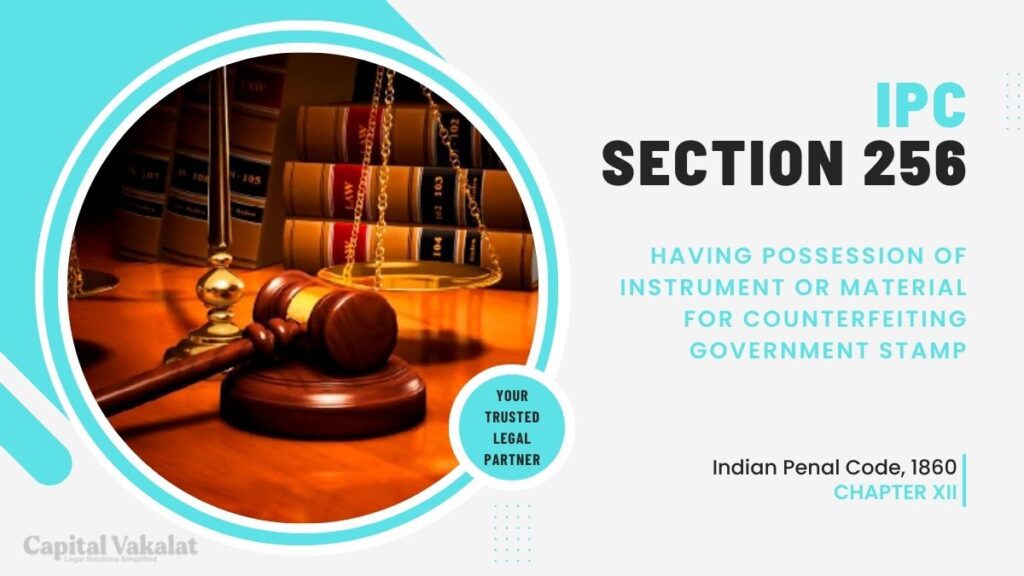Counterfeiting government stamps is a serious offense in most legal jurisdictions. Section 256 of the Indian Penal Code (IPC) addresses this issue, making it unlawful for individuals to possess instruments or materials intended for the counterfeiting of government stamps.

This article will delve into the details of this section, exploring its implications, legal consequences, defenses, and the broader impact it has on counterfeiting and government revenue.
Understanding the Offense
Before we dive into the specifics of Section 256 IPC, it’s essential to understand the key elements of this offense.
- What constitutes ‘having possession of instrument or material’?
- This section encompasses any person who knowingly has in their possession any instrument, material, or other things intended to be used for counterfeiting government stamps. Such instruments or materials could include printing plates, inks, papers, or any equipment designed for counterfeiting.
- **What is a ‘Government stamp’?
- A government stamp typically refers to official documents or revenue stamps issued by the government. These stamps are used to validate various transactions, such as property deeds, legal agreements, and taxation documents.
Legal Consequences
Violating Section 256 IPC can lead to severe legal consequences:
- Penalties and punishments under Section 256 IPC:
- Individuals found guilty under this section can face imprisonment for up to seven years, along with fines. The severity of punishment may vary depending on the specifics of the case.
- Examples of cases and outcomes:
- To illustrate the practical implications of this law, we can look at real-life cases where individuals were prosecuted and convicted for possessing counterfeiting materials. Such examples serve as a deterrent and reinforce the seriousness of the offense.
Defenses and Exceptions
While Section 256 IPC clearly criminalizes the possession of instruments or materials for counterfeiting government stamps, there are certain circumstances where individuals may have valid defenses:
- Circumstances where possession might not lead to conviction:
- If it can be demonstrated that the possession of such instruments or materials was unintentional or without the knowledge of their intended use in counterfeiting, a defense might be established. Proving a lack of criminal intent is crucial in such cases.
Enforcement of the Law
The effective enforcement of Section 256 IPC is vital in deterring potential offenders:
- Role of law enforcement agencies:
- Various law enforcement agencies, including the police and revenue departments, play a critical role in identifying and investigating cases related to this offense.
- Investigation and evidence collection:
- The process of collecting evidence to build a strong case against the accused involves thorough investigation techniques and the expertise of forensic experts to link the materials to counterfeiting activities.
Impact on Counterfeiting
The implementation of Section 256 IPC has a broader impact on counterfeiting and government revenue:
- Deterrence and prevention:
- This law serves as a strong deterrent against those considering engaging in counterfeiting. The fear of severe legal consequences can dissuade potential offenders.
- Case studies and statistics:
- Analyzing specific cases and statistics can shed light on the effectiveness of this law in curbing counterfeiting activities and protecting government revenues.
Challenges in Prosecution
Prosecuting cases under Section 256 IPC comes with its own set of challenges:
- Burden of proof:
- The burden of proof lies with the prosecution to establish not only possession but also the intention to use the instruments for counterfeiting.
- Gathering evidence:
- Collecting and preserving evidence that connects the accused with the counterfeiting activity can be complex, requiring meticulous attention to detail.
Importance of Section 256 IPC
The significance of this section extends beyond punishing offenders. It plays a vital role in:
- Safeguarding government revenues:
- Preventing counterfeiting of government stamps ensures that the state’s revenues are protected, which is essential for funding public services and infrastructure.
- Upholding the integrity of official documents:
- By maintaining the authenticity of government stamps, the legal system ensures the integrity of official documents and transactions.
Recent Developments and Amendments
As laws evolve, so does Section 256 IPC:
- Changes in the law over time:
- Exploring any recent amendments or developments in this law and their implications for those involved in counterfeiting.
- Implications for offenders:
- Understanding how changes in the law may affect the potential consequences for offenders.
Conclusion
Section 256 IPC serves as a crucial tool in the fight against counterfeiting government stamps. It deters offenders, protects government revenues, and upholds the sanctity of official documents. To ensure a fair and just legal system, it is essential that this law is consistently enforced and updated to address the evolving tactics of counterfeiters.
Frequently Asked Questions
Are there any exceptions where possession of such materials is not considered an offense?
Yes, if it can be proven that possession was unintentional or without knowledge of their intended use for counterfeiting.
How does the government track down individuals possessing counterfeiting materials?
Law enforcement agencies use investigative techniques, forensic experts, and evidence collection to link individuals to counterfeiting activities.
Why is protecting government stamps crucial?
Government stamps are used to validate various transactions, and protecting their authenticity is vital to maintaining the integrity of official documents.
Are there any recent amendments to Section 256 IPC?
Changes in the law may occur over time, and it’s important to stay updated on any amendments and their implications for offenders.